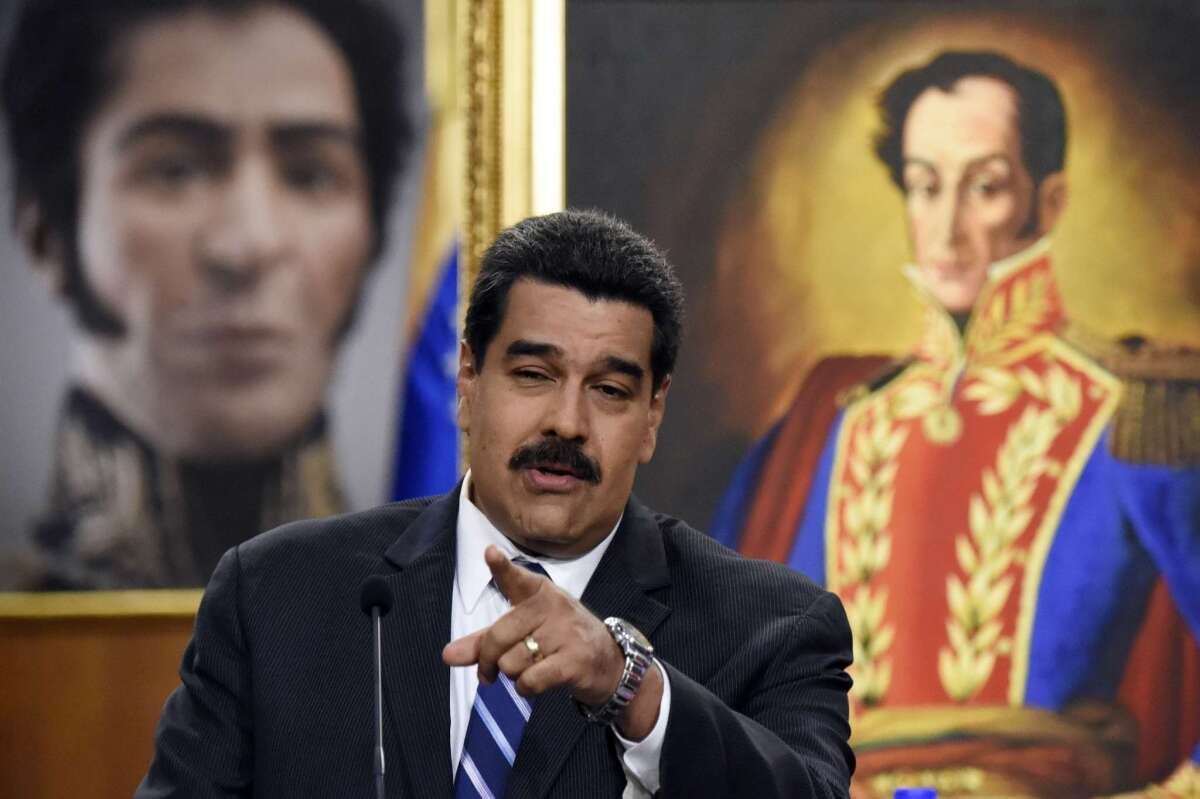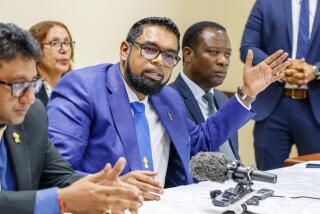Venezuela’s president hits road to save ailing economy

- Share via
Reporting from Caracas, Venezuela — His economy reeling from the global decline in oil prices, Venezuelan President Nicolas Maduro traveled to Russia on Monday on the first leg of a tour designed partly to obtain an infusion of cash for his ailing economy.
The trip also will include a stop in China, where he is expected to ask for another loan to address the government’s acute cash shortage. Since 2007, China has advanced Venezuela more than $50 billion in cash to be paid off by future oil deliveries.
Most recently, Venezuela received a $4 billion loan in July during a visit by Chinese President Xi Jinping.
Maduro announced the trip Sunday night in a speech to a nationwide TV audience after earlier admitting that Venezuela had entered a recession and faced serious economic problems.
Oil revenue finances 95% of the government budget, and last week saw another decline in the average price of a barrel of Venezuelan crude.
The price dipped to $47.05 a barrel, down $2.47 from the week before and less than half the $97.31 average price for December 2013.
“I leave on a very important trip to deal with new projects ... and the decline in revenues that are the product of the sharp decline in oil prices,” said Maduro. He added that he will also visit three OPEC countries to push his plan to cut production as a way to prop up crude prices. A similar Maduro proposal was rejected by OPEC members in November.
Venezuela’s economic problems predate the oil price decline. Deficit spending by Maduro’s predecessor Hugo Chavez, low investment and double-digit inflation have weakened the economy and produced widespread shortages of basic food items.
In September, Standard & Poor’s debt rating service downgraded Venezuelan debt, with a negative outlook citing “growing economic distortions and sustained political polarization” that raised the risk of the country defaulting on its debt over the next two years.
Venezuela was critically short of cash, according to the S&P report. Of $20.8 billion in foreign reserves held by the central bank in September, “only $2.5 billion is liquid,” the firm said.
But the precipitous fall in oil prices in recent weeks has put additional pressure on Maduro, a former bus driver and union leader who rose to become foreign minister and then vice president before the death of his predecessor, Hugo Chavez, elevated him to the presidency in March 2013.
On Friday, José Antonio Gil, director of the Datanalisis polling firm, told a TV interviewer in Caracas that Maduro’s approval rating among Venezuelan voters had fallen to 22%, a decline of 8 percentage points since October.
The New York investment firm Barclays said in a report last month titled “Chronicles of a Death Foretold” that while it did not expect Venezuela to default on its foreign debt, it anticipated Maduro would soon announce a major devaluation. A drastic reduction in government spending could also be in the offing, Barclays said.
A sign of more pain to come is reflected in Barclay’s estimate that after a “devastating” shrinkage in Venezuela’s economy by a negative 4.4% in 2014, total economic output of goods and services will shrink by a further 6.2% in 2015.
“We do not see a catalyst for a significant recovery in his support,” Barclays wrote, referring to Maduro’s plunging voter approval numbers.
Venezuela claims officially to export roughly 2.5 million barrels of oil per day, of which 600,000 go to China. More than half the oil sent to China is earmarked to pay off loans, according to official figures.
Industry analysts, however, say Venezuela exports much less than it claims, with some estimating total oil production at no higher than 2.3 million barrels per day.
In early December, Maduro sent Finance Minister Rodolfo Marco Torres and Education Minister Hector Rodriguez to China on an official mission to strengthen bilateral relations. El Pais newspaper of Spain reported that the cabinet officials also asked for another cash advance, which the Chinese rejected.
Special correspondent Mogollon reported from Caracas and Kraul from Bogota, Colombia.
More to Read
Sign up for Essential California
The most important California stories and recommendations in your inbox every morning.
You may occasionally receive promotional content from the Los Angeles Times.










